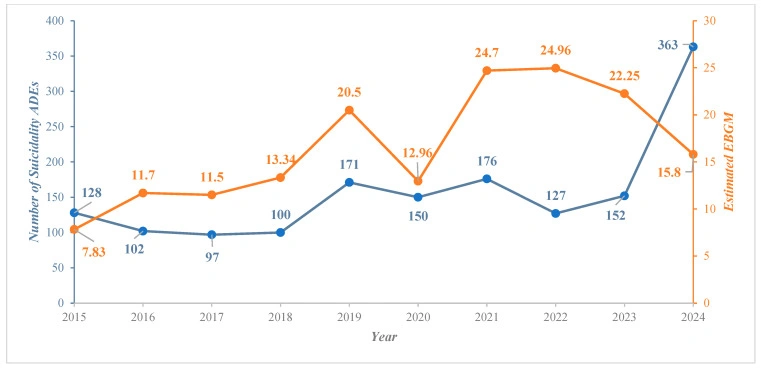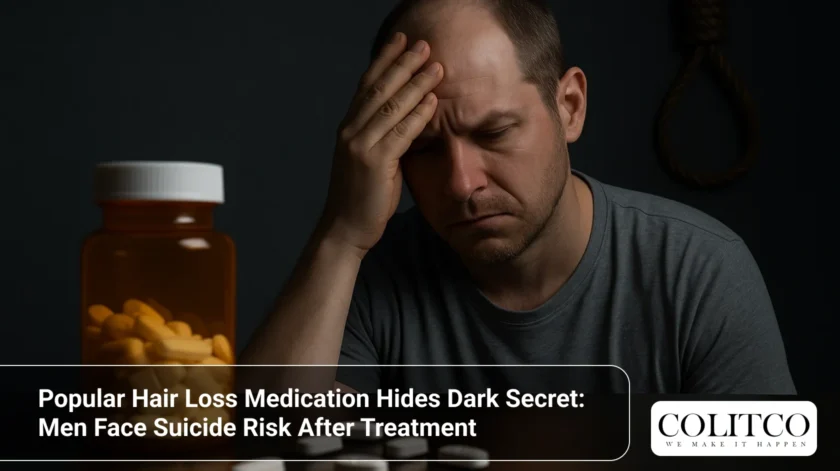Millions of men worldwide reach for finasteride when thinning hair threatens their confidence. What they don’t expect is a battle with depression so severe it drives some to contemplate ending their lives.
The European Medicines Agency dropped a bombshell in May 2025. Finasteride, sold as Propecia for hair loss and Proscar for prostate issues, officially causes suicidal thoughts. This confirmation arrived more than two decades after doctors first raised concerns.
The Hidden Toll of a Cosmetic Treatment
Professor Mayer Brezis from Hebrew University of Jerusalem spent months analysing data that pharmaceutical companies and regulators ignored for years. His findings, published in the Journal of Clinical Psychiatry in October 2025, paint a grim picture.

By 2011, just 18 suicides had been linked to finasteride in official reports. Statistical models suggest the real figure should have sat between 6,440 and 12,880 deaths over the same period.
That gap represents thousands of unreported tragedies. Families never connected their loved one’s death to a hair loss pill. Doctors failed to spot the link. Dead men couldn’t speak up.
Professor Brezis estimates hundreds of thousands suffered from finasteride-related depression over the past 20 years. The death toll may reach into the hundreds, possibly more.
When Regulators Fail to Act
Internal FDA files from 2010 contained entire sections redacted as “confidential.” These documents included estimates of affected patients that the public never saw.
The agency acknowledged depression as a possible side effect in 2011. It took another 11 years before suicidal thoughts appeared on the label in 2022. Europe’s regulatory shift came three years later in 2025.
Research teams had been sounding alarms since 2002. Nobody with the power to act seemed to be listening.
A recent study published in March 2025 analysed adverse event reports from 2006 to 2023. The pattern shocked researchers. No significant signals appeared before 2011, when Post-Finasteride Syndrome gained recognition.
After 2013, the data exploded:
- 2013-2018: Men taking 1mg finasteride showed 3.63 times higher risk of suicidal thoughts
- 2019-2023: That risk jumped to 9.90 times higher than non-users
- The 5mg dose showed similar but slightly lower increases
These aren’t small numbers dismissed by statistical noise. They represent real people whose brains were fundamentally altered by a medication they trusted.

How a Hair Loss Drug Attacks the Brain
Finasteride blocks an enzyme called 5α-reductase. This enzyme converts testosterone into dihydrotestosterone (DHT), the hormone that shrinks hair follicles in men with pattern baldness.
The problem? That same enzyme helps produce neurosteroids like allopregnanolone. These brain chemicals regulate mood, memory, and emotional responses.
When finasteride interferes with neurosteroid production, it can trigger lasting brain changes. Research shows inflammation in memory and emotion centres. Brain cell generation patterns shift abnormally.
Some men never recover, even years after stopping the medication. This persistent cluster of symptoms earned a name in 2012: Post-Finasteride Syndrome.
The Post-Finasteride Syndrome Foundation has documented thousands of cases worldwide. Men report devastating sexual dysfunction, severe depression, cognitive impairment, and suicidal ideation that persists long after discontinuing the drug.
Australia’s Growing Mental Health Crisis
The finasteride revelations arrive as Australia grapples with mental health challenges across multiple sectors. From mining workers facing isolation to the broader community dealing with treatment access issues, the nation confronts complex psychological health concerns.
Recent investigations into mental health misinformation on social media highlight how difficult it can be for people to access reliable health information. Young men seeking hair loss solutions often turn to online forums and telehealth services that may not adequately screen for mental health risks.
Who’s Most at Risk?
Current evidence suggests men with prior mood disorders face heightened danger. One study found finasteride significantly increased suicidal behaviour risk among individuals with mental health histories.
However, research published in October 2025 revealed something more disturbing. Even men without sexual side effects or pre-existing psychiatric conditions developed severe depression and suicidal thoughts after taking finasteride.
The drug doesn’t discriminate by age, dosage, or indication. Whether prescribed 1mg for baldness or 5mg for prostate enlargement, the psychiatric risks remain.
What Doctors Should Be Doing Now
European regulators now mandate specific precautions. Healthcare professionals must advise patients to stop treatment immediately if they experience depression or suicidal thoughts.
Patient alert cards will be included in 1mg finasteride packages across 27 EU nations. These cards warn about both sexual dysfunction and psychiatric side effects.
The European Medicines Agency stopped short of banning the drug. Officials concluded benefits still outweigh risks for approved uses. That decision sparked fierce criticism from patient advocacy groups.
“This wasn’t about life or death medical necessity,” Professor Brezis argued. “This was about hair.”
Also Read: NT Trio Appear in Court Over Alleged $71 Million Defence Procurement Fraud
The Path Forward
France rejected the European Medicines Agency’s recommendations entirely. Despite enacting the world’s strictest finasteride safety measures three years ago, the French drug authority ANSM reported in May 2025 that serious psychiatric disorders continue appearing.
The agency identified two additional suicides after the EMA ruling. French authorities believe the risks justify stronger action than their European counterparts recommended.
Australian men considering finasteride treatment deserve full disclosure about these risks. The medication works for many without serious side effects. But for others, it triggers a nightmare that may never end.
Anyone currently taking finasteride should discuss these findings with their doctor. Mental health screening before starting treatment could prevent tragedies. Regular monitoring during use might catch warning signs early.
The broader mental health crisis affecting Australians demands we take pharmaceutical psychiatric risks seriously. When cosmetic treatments carry potentially fatal consequences, informed consent becomes critical.
Hair loss affects self-esteem and confidence. But it doesn’t kill people. Depression and suicide do.












